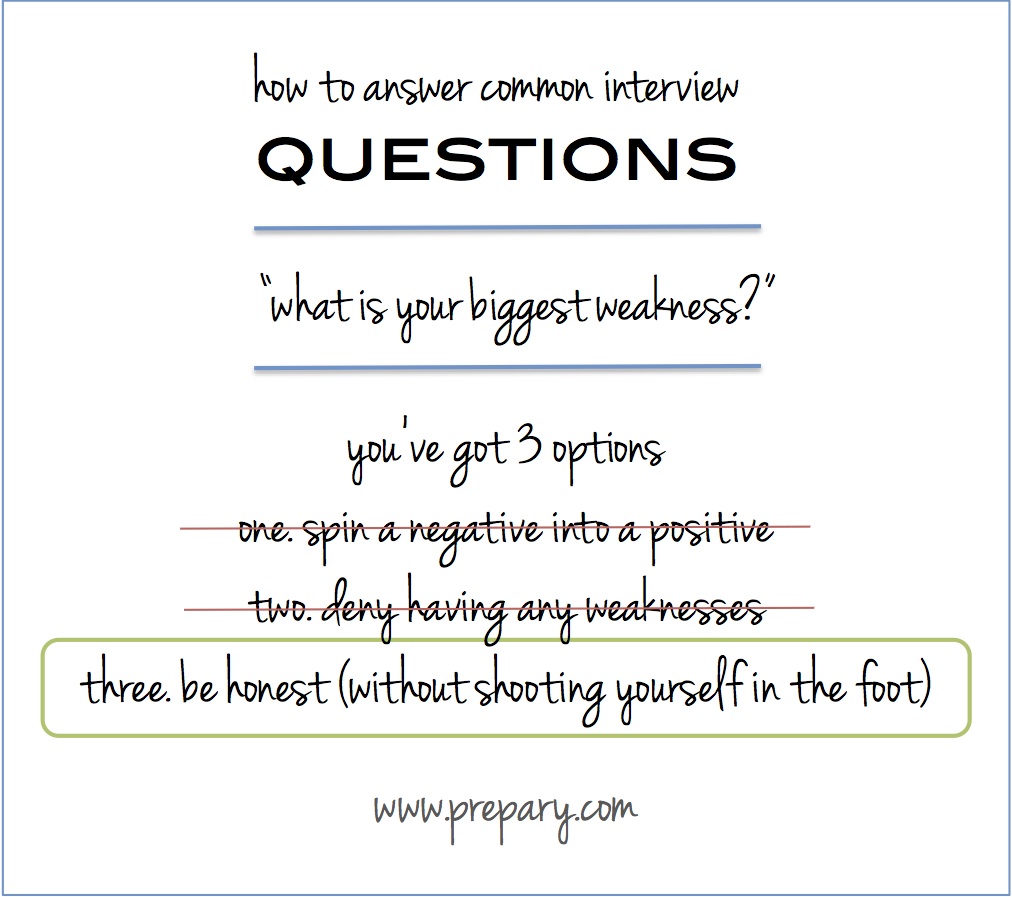A really common interview question across industries is about strengths and weaknesses. Answering the part about your biggest strength is easy (for most) but lots of people trip up on the other side of the question: “What is your biggest weakness”.
Some other forms of the question may be: “Tell me your biggest weakness?”/”What is an area you are trying to develop or work on?”/”What is something you are not as strong at?”

When you google how to answer this there are a lot of mixed opinions but they generally fall into one of three camps:
- Spin a negative into a positive (i.e. “Sometimes I spend too much time checking my work because I want to make sure it is perfect.”)
- Deny having any weaknesses (ok, so this one is the least common, and it’s pretty obvious this is not the way to go)
- Give an honest answer (i.e. “An area I am trying to work on is public speaking. It is not naturally something I’ve been able to master.”)
I firmly believe in option 3. Answer the question honestly… without shooting yourself in the foot.
Why?
Well, to start off, giving a canned answer makes the person on the other end feel like they are speaking to a robot. And any good interviewer knows this is the oldest trick in the book (and has probably heard anything you’ve managed to come up with about 100 times before). It comes off as the opposite of genuine. If the interviewer is experienced (and you should expect them to be) they will take the question a step further to see if your answer has any depth (which if it is canned it probably doesn’t) and ask you “ok, so give me an example of a time when that impacted your work negatively.” If you don’t have a real example ready to back that up, guess what… you’re probably going to be sitting there racking your brain for another weakness and maybe even fall into pitfall #2…
Which is even worse… Being unable or unwilling to come up with anything at all only means one thing – you are not self aware. The truth is (and everyone knows this) no one is going to be good at every single thing they do. Constantly identifying areas you can work on and then taking steps to actually improve them makes you a better employee, co-worker, friend, family member, etc (you get the point). Very few people out there are going to want to sit next to someone every day who thinks they are 100% perfect.
So let’s get to the point, why should you answer the question honestly? A few reasons…
1. As explained above, giving an honest answer makes you come across as genuine, honest, thoughtful, and self aware (all great qualities that interviewers are looking for).
2. It actually will enable you to be in a role that you can succeed in. The person on the other end knows what the company is looking for (overall and for the specific job) and is trying to make sure you are a good fit for both. If your biggest weakness is genuinely public speaking and you are applying for a role that requires constantly presenting to large audiences – it’s probably better that they know that up front – and maybe better that you don’t get that role (it’s just not a good fit). But in that case, why are you applying for that role anyway?
Now here is how to ace it:
[give a real weakness] + [explain what steps you’ve taken to improve]
An answer like that shows off a really great quality (that is universally important to people) which is that you can adjust to different scenarios and learn new things. A few examples of solid answers:
“When I took my first internship at Company X, I realized that I struggled with public speaking and presenting. Realizing that this was not my strong suit, I signed up for a class when I got back to school all about public speaking. Honestly, it is something I may always need to work on but I am really proud about the strides I’ve made so far.”
“When I started at my current role, there were lots of different competing priorities in the day. I definitely had trouble balancing them and needed to become more organized. Now I use a task management app to keep track of the many requests and move them around as necessary. Though I won’t always get to every single thing on the list, I now make sure I communicate what I can and can’t get done which has really helped.”
At the end of the day, interviewers appreciate honesty and effort and this is the best way to show those great qualities off while answering this question. It goes without saying to not give a weakness that is a “deal-breaker” – don’t tell your future employer you have no clue how to use excel if it is listed as a key requirement of the job. But believe it or not, the canned answer approach can be seen as a “deal-breaker” in itself… so be thoughtful and give an answer with some substance and honesty – it will go a long way.





